Related Research Articles
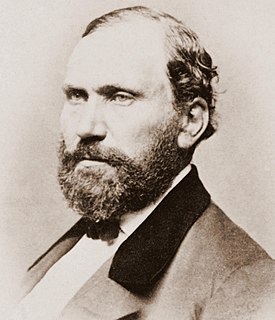
Allan J. Pinkerton was a Scottish–American detective and spy, best known for creating the Pinkerton National Detective Agency.

The Peninsula campaign of the American Civil War was a major Union operation launched in southeastern Virginia from March through July 1862, the first large-scale offensive in the Eastern Theater. The operation, commanded by Maj. Gen. George B. McClellan, was an amphibious turning movement against the Confederate States Army in Northern Virginia, intended to capture the Confederate capital of Richmond. McClellan was initially successful against the equally cautious General Joseph E. Johnston, but the emergence of the more aggressive General Robert E. Lee turned the subsequent Seven Days Battles into a humiliating Union defeat.
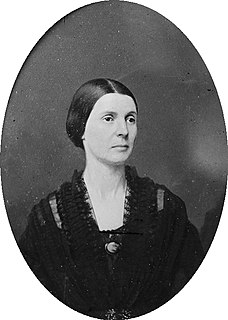
Rose O'Neal Greenhow was a renowned Confederate spy during the American Civil War. A socialite in Washington, D.C., during the period before the war, she moved in important political circles and cultivated friendships with presidents, generals, senators, and high-ranking military officers including John C. Calhoun and James Buchanan. She used her connections to pass along key military information to the Confederacy at the start of the war. In early 1861, she was given control of a pro-Southern spy network in Washington, D.C., by her handler, Thomas Jordan, then a captain in the Confederate Army. She was credited by Jefferson Davis, the Confederate president, with ensuring the South's victory at the First Battle of Bull Run in late July 1861.
Tactical or battlefield intelligence became very vital to both sides in the field during the American Civil War. Units of spies and scouts reported directly to the commanders of armies in the field. They provided details on troop movements and strengths. The distinction between spies and scouts was one that had life or death consequences. If a suspect was seized while in disguise and not in his army's uniform, the sentence was often to be hanged. A spy named Will Talbot, a member of the 35th Battalion, Virginia Cavalry, was left behind in Gettysburg after his battalion had passed through the borough on June 26–27, 1863. He was captured, taken to Emmitsburg, Maryland, and executed on orders of Brig. Gen. John Buford.
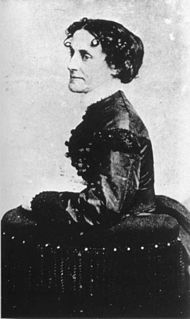
Elizabeth Van Lew was an American abolitionist and philanthropist who built and operated an extensive spy ring for the Union Army during the American Civil War.

The Seven Days Battles were a series of seven battles over seven days from June 25 to July 1, 1862, near Richmond, Virginia, during the American Civil War. Confederate General Robert E. Lee drove the invading Union Army of the Potomac, commanded by Maj. Gen. George B. McClellan, away from Richmond and into a retreat down the Virginia Peninsula. The series of battles is sometimes known erroneously as the Seven Days Campaign, but it was actually the culmination of the Peninsula Campaign, not a separate campaign in its own right.

The Battle of Williamsburg, also known as the Battle of Fort Magruder, took place on May 5, 1862, in York County, James City County, and Williamsburg, Virginia, as part of the Peninsula Campaign of the American Civil War. It was the first pitched battle of the Peninsula Campaign, in which nearly 41,000 Federals and 32,000 Confederates were engaged, fighting an inconclusive battle that ended with the Confederates continuing their withdrawal.

Benjamin Huger was a regular officer in the United States Army, who served with distinction as chief of ordnance in the Mexican–American War and in the American Civil War, as a Confederate general. He notably surrendered Roanoke Island and then the rest of the Norfolk, Virginia shipyards, attracting criticism for allowing valuable equipment to be captured. At Seven Pines, he was blamed by General James Longstreet for impeding the Confederate attack, and was transferred to an administrative post after a lacklustre performance in the Seven Days Battles.
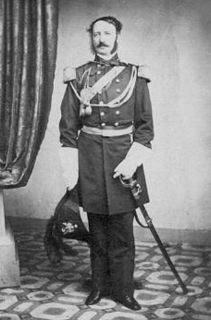
John Bankhead Magruder was an American and Confederate military officer. A graduate of West Point, Magruder served with distinction during the Mexican–American War (1846–1848) and was a prominent Confederate Army general during the American Civil War (1861–1865). As a major general, he received recognition for delaying the advance of Maj. Gen. George B. McClellan's prodigiously large force, the Army of the Potomac, during the 1862 Peninsula Campaign, as well as recapturing Galveston, Texas the following year.
Black Dispatches was a common term used among Union military men in the American Civil War for intelligence on Confederate forces provided by African Americans, who often were slaves aiding the Union forces. They knew the terrain and could move within many areas without being noticed; their information represented a prolific and productive category of intelligence obtained and acted on by Union forces throughout the Civil War.
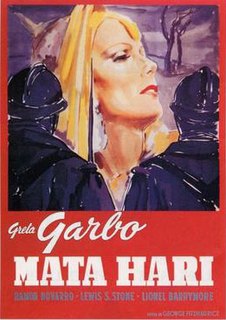
Mata Hari is a 1931 American pre-Code drama film directed by George Fitzmaurice loosely based on the life of Mata Hari, an exotic dancer and courtesan executed for espionage during World War I. The Metro-Goldwyn-Mayer film stars Greta Garbo in the title role. It was Garbo's most commercially successful vehicle. Only a censored version of the film is currently available.
Aaron Van Camp was an espionage agent for the Confederate States of America during the American Civil War. He and his son Eugene B. Van Camp were members of the Rose O'Neal Greenhow Confederate spy ring, which in 1861 was broken up by Allan Pinkerton, head of the newly formed Secret Service.

Cypriano Ferrandini was a barber from Corsica who emigrated to the United States, and established himself as the long-time barber and hairdresser in the basement of Barnum's Hotel, in Baltimore, Maryland. There he practiced his trade from the mid-1850s to his retirement long after the close of the Civil War. He was accused, but never indicted for plotting to assassinate President-elect of the United States Abraham Lincoln on February 23, 1861, and while once caught in a secessionist dragnet in 1862, was never prosecuted for his pro-Southern convictions.

Hattie Lawton, also known as Hattie H. Lawton, Hattie Lewis, and Hattie Lewis Lawton was an American detective, who worked for Allan Pinkerton, of the Pinkerton Detective Agency. Lawton may have been born around 1837, although most details of her life, before and after the American Civil War, are unknown. "[Hattie] Lawton was part of Pinkerton's Female Detective Bureau, formed in 1860 to 'worm out secrets' by means unavailable to male detectives."
Kate Warne was an American law enforcement officer, known as the first female detective, in 1856, in the Pinkerton Detective Agency and the United States.

Timothy Webster was a British-born American lawman and soldier. He served as a Pinkerton agent and Union spy, and was the first spy in the American Civil War to be executed.
A large contingent of African Americans served in the American Civil War. 186,097 black men joined the Union Army: 7,122 officers, and 178,975 enlisted soldiers. Approximately 20,000 black sailors served in the Union Navy and formed a large percentage of many ships' crews. Later in the War, many regiments were recruited and organized as the United States Colored Troops, which reinforced the Northern side substantially in the last two years. Both Northern free blacks and Southern runaway slaves joined the fight. Throughout the course of the war, black soldiers served in forty major battles and hundreds of more minor skirmishes; sixteen African Americans received the Medal of Honor.
The Bureau of Military Information (BMI) was the first formal and organized American intelligence agency, active during the American Civil War.

The Battle of Malvern Hill, also known as the Battle of Poindexter's Farm, was fought on July 1, 1862, between the Confederate Army of Northern Virginia, led by Gen. Robert E. Lee, and the Union Army of the Potomac under Maj. Gen. George B. McClellan. It was the final battle of the Seven Days Battles during the American Civil War, taking place on a 130-foot (40 m) elevation of land known as Malvern Hill, near the Confederate capital of Richmond, Virginia and just one mile (1.6 km) from the James River. Including inactive reserves, more than fifty thousand soldiers from each side took part, using more than two hundred pieces of artillery and three warships.
Pryce Lewis was an operative of the Pinkerton Detective Agency and Union spy during the American Civil War. His activities in Charleston, Virginia and the surrounding area heavily assisted the Union Army during the early years of the war. Lewis was later captured and played a part in the trial and execution of fellow agent Timothy Webster.
References
- Markle, D. E. (1994). Spies and spymasters of the Civil War. New York, Hippocrene Books.